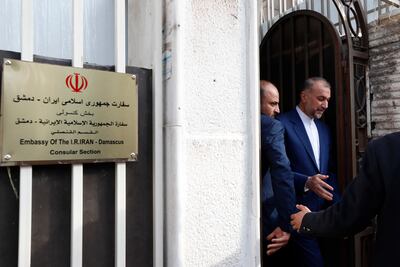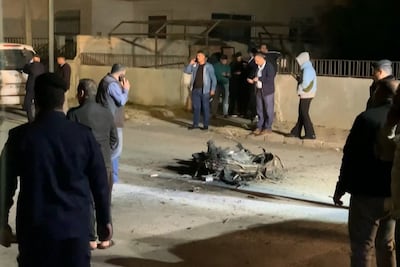Live updates: Follow the latest on Israel-Gaza
Israel's war cabinet met on Monday to discuss how to respond to Iran's direct attack against the country overnight on Saturday.
The cabinet, led by Israeli Prime Minister Benjamin Netanyahu, discussed retaliation options that are intended to be "painful" to Iran without sparking a full-blown war, Israeli outlet Channel 12 reported.
Israeli Defence Minister Yoav Gallant reportedly told US Secretary of Defence Lloyd Austin on Sunday that Israel had no choice other than respond to Iran after it launched hundreds of missiles and drones against Israel.
It was Tehran's first known direct attack against Israel and marked the start of a new chapter in the confrontation between the two countries.
Tehran has claimed that it gave its neighbours advanced warning of the attack, showing its desire to prevent a full-scale war.
Turkish, Jordanian and Iraqi officials confirmed that Tehran communicated a notice several days before the attack. But US officials refuted Tehran's claim and accused it of attempting to inflict considerable damage on Israel.
Tehran said the attack was in retaliation for the Israeli strike on the Iranian consulate in Damascus, on April 1, and that any further escalation would depend on the Israeli response.
Most of the drones and missiles were shot down before reaching Israeli territory, but a young girl was injured.
“Iran had issued the necessary warnings before the military action," Iranian Foreign Ministry spokesman Nasser Kanaani said on Monday. “Iran does not seek to develop tension in the region.”
Iranian Foreign Minister Hossein Amirabdollahian, who made phone calls to regional counterparts explaining Tehran's position, said Tehran gave fair warning to countries of the region and the US.
“About 72 hours before the … operation, Iran informed the neighbours and countries in the region that Iran's response is definite and certain in the form of legitimate defence”, he told state-run media.
Last week, Israel said it would retaliate with an attack on Iranian territory if it were attacked by Tehran, despite US concerns, sources said.
Aware of the possibilities
In Ankara, Turkey's Foreign Ministry said it had spoken to both Washington and Tehran before the attack. It conveyed messages as an intermediary to be sure reactions were proportionate, it added.
“Iran said the reaction would be a response to Israel’s attack on its embassy in Damascus and that it would not go beyond this. We were aware of the possibilities. The developments were not a surprise,” a Turkish diplomatic source told Reuters.
One senior official in US President Joe Biden's administration said Washington has contact with Iran through Swiss intermediaries but did not receive notice of the attack 72 hours in advance.
“That is absolutely not true,” the official said. “They did not give a notification, nor did they give any sense of … 'these will be the targets, so evacuate them.'”
Iran sent the US a message only after the strikes began and the intent was to be “highly destructive” said the official, adding that Iran's claim of a widespread warning may be an attempt to compensate for the lack of any major damage from the attack.
“We received a message from the Iranians as this was ongoing, through the Swiss. This was basically suggesting that they were finished after this, but it was still an ongoing attack. So that was [their] message to us,” the US official said.
Diplomatic flurry
Following the weekend attack, Iran was quick to increase its diplomatic contacts with its regional neighbours, with Mr Amirabdollahian speaking with his Saudi and Qatari counterparts on Sunday.
Saudi Arabia's Foreign Minister Prince Faisal bin Farhan received a phone call from Mr Amirabdollahian.
“During the call, repercussions from developments in the situation in the region and the increasing escalation against the backdrop of the crisis in Gaza Strip were discussed,” Saudi Arabia's Foreign Ministry said.

Qatar's Foreign Minister expressed his deep concern over regional developments and his commitment to “support efforts at achieving stability on all levels” during discussions with Mr Amirabdollahian, Qatari state media reported.
In a phone call with his Russian counterpart, Mr Amirabdollahian outlined the “objectives and the manner of military action of Iran on specific targets in the occupied territories”.
“This limited action is aimed at deterring, punishing and warning the Zionist regime,” the Iranian Foreign Minister told Russian Foreign Minister Sergey Lavrov.

“We had no doubt that Iran will respond to the Israeli regime's attack on Iran's embassy, and we believe that the process of carrying out this action was based on a responsible and restrained response,” Mr Lavrov said.
Jordan’s Foreign Minister Ayman Safadi said his country had summoned the Iranian ambassador to protest against Iranian comments that were seen as interference in the kingdom’s internal affairs.
In remarks given to state-owned Mamlaka public broadcaster, Mr Safadi was referring to comments in Iran’s official media that it warned Jordan would be struck next in the event it co-operated with Israel.
US Secretary of State Antony Blinken discussed Iran’s attack on Israel in separate calls with Jordanian, Saudi, Egyptian and Turkish counterparts, the US State Department said, during which he said that the US “does not seek escalation” and will continue to support Israel’s defence.

